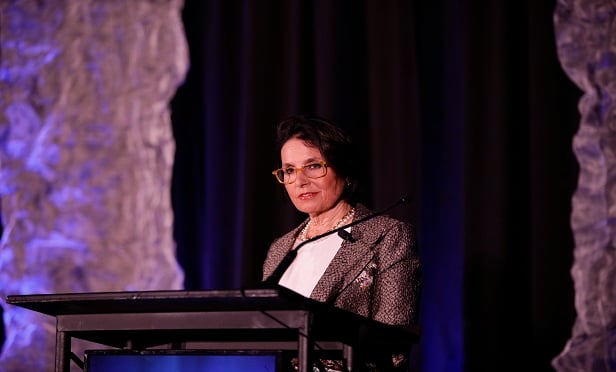 Speaking to a packed ballroom filled with women and men, Barbara Bufkin, executive head of business development at Assurant and chair of IICF's international board of governors said: “We design our future and our purpose.” (Photo: Marget Long)
Speaking to a packed ballroom filled with women and men, Barbara Bufkin, executive head of business development at Assurant and chair of IICF's international board of governors said: “We design our future and our purpose.” (Photo: Marget Long)
A wave of change has swept through the insurance industry in recent years. The rising prevalence of autonomous vehicles, Internet of Thing devices and a surge in artificial intelligence implementation, among other changes, are molding the industry into something new entirely. And though change is necessary to grow and succeed, there are certain components that the world of insurance is deeply rooted in as a part of its identity. One such component is its commitment to advancing change from within.
These thoughts came to mind as I attended the Insurance Industry Charitable Foundation's (IICF) Women in Insurance Global Conference on June 12, 2019, in New York City. The theme of this year's conference, running from June 12-14, is “Gender Equity in a Changing World — What You Do Matters! Rewriting the Rules on Leadership, Diversity and Innovation.”
Recommended For You
Want to continue reading?
Become a Free PropertyCasualty360 Digital Reader
Your access to unlimited PropertyCasualty360 content isn’t changing.
Once you are an ALM digital member, you’ll receive:
- Breaking insurance news and analysis, on-site and via our newsletters and custom alerts
- Weekly Insurance Speak podcast featuring exclusive interviews with industry leaders
- Educational webcasts, white papers, and ebooks from industry thought leaders
- Critical converage of the employee benefits and financial advisory markets on our other ALM sites, BenefitsPRO and ThinkAdvisor
Already have an account? Sign In Now
© Touchpoint Markets, All Rights Reserved. Request academic re-use from www.copyright.com. All other uses, submit a request to [email protected]. For more inforrmation visit Asset & Logo Licensing.








